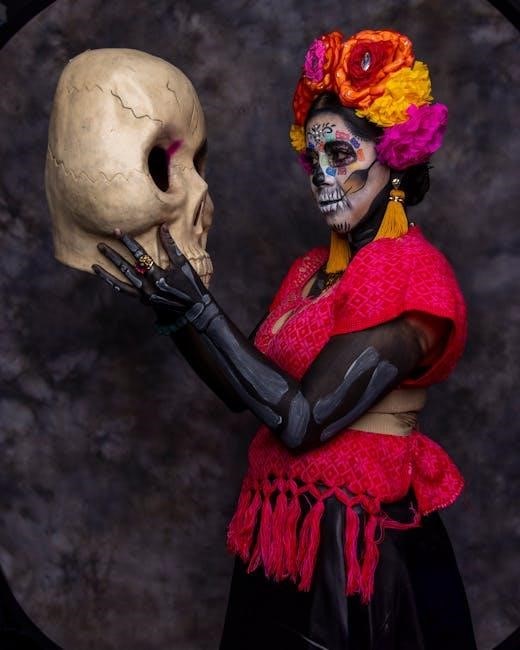
el valor de la mujer gonzalo vega pdf
Gonzalo Vega’s book, El Valor de la Mujer, explores the significance of women’s roles in society, emphasizing their strengths, integrity, and contributions․ Published in 2002, it highlights the evolution of gender roles and advocates for women’s empowerment through education and equality, offering a insightful perspective on their value in modern and historical contexts․
Overview of the Book
El Valor de la Mujer by Gonzalo Vega is a thought-provoking work that delves into the societal roles and contributions of women․ Published in 2002, the book examines the historical and contemporary contexts of women’s lives, emphasizing their psychological strengths, emotional intelligence, and resilience․ Vega advocates for gender equality, highlighting the importance of education and professional opportunities as tools for empowerment․ The book also explores the challenges women have historically faced and the progress made toward breaking stereotypes․ Through a mix of literary analysis and social commentary, Vega underscores the value of women in shaping societies, making it a relevant read for understanding gender dynamics and fostering change․
Importance of the Topic
The topic of El Valor de la Mujer holds significant relevance in understanding the societal, cultural, and historical dynamics surrounding women’s roles․ Gonzalo Vega’s work sheds light on the evolution of gender roles, emphasizing the importance of recognizing women’s contributions to society․ By exploring their psychological strengths, emotional intelligence, and resilience, the book inspires a deeper appreciation for women’s value in both historical and contemporary contexts․ The subject is crucial for fostering gender equality, challenging stereotypes, and promoting empowerment․ It serves as a powerful tool for sparking conversations about women’s rights and their integral role in shaping societies, making it a timeless and impactful read for all genders․
Structure of the Article

Historical Context of Women’s Roles
Traditionally, women’s roles were shaped by societal norms, evolving over time․ Key figures like Manuela Medina exemplified strength and resilience, challenging traditional expectations and paving the way for future generations․
Traditional Gender Roles in Society
Traditionally, women were often confined to domestic roles, emphasizing nurturing and submissiveness․ Society viewed their value primarily through marital and maternal contributions, limiting their participation in public and professional spheres․ These roles were deeply ingrained in cultural norms, often excluding women from decision-making processes․ Gonzalo Vega’s work highlights how such roles undervalued women’s intellectual and leadership potential․ Over time, these norms have evolved, recognizing women’s multifaceted contributions beyond traditional expectations․ However, historical records show that women like Manuela Medina challenged these limitations, demonstrating strength and resilience․ Their stories, as depicted in Vega’s work, underscore the importance of redefining societal perceptions of women’s roles and value․
Evolution of Women’s Rights
The evolution of women’s rights has been a gradual and transformative journey, marked by significant milestones․ Historically, women faced societal constraints, but their active participation in movements like independence struggles showcased their capabilities․ Education emerged as a pivotal tool, enabling women to challenge traditional norms and seek equality․ Gonzalo Vega’s work highlights how women’s roles expanded from domestic spheres to professional and political arenas․ The recognition of their contributions in various fields underscores the ongoing fight for gender equality․ Today, women continue to break barriers, advocating for rights and challenging stereotypes, as documented in Vega’s book, which emphasizes their growing influence and the importance of valuing their diverse roles in society․
Key Figures in Women’s Empowerment
Key figures in women’s empowerment, as highlighted in Gonzalo Vega’s work, include trailblazers like Manuela Medina and Doña Juana, who exemplified courage and leadership․ Martina, from La señora presidenta, symbolizes women’s influence in politics and societal change․ Historical figures like Margarita Cabrera and contemporary advocates emphasize women’s intellectual and emotional strengths․ These individuals, along with others, have challenged stereotypes and inspired future generations to value women’s contributions in all spheres․ Their stories, as documented in Vega’s book, underscore the importance of recognizing and celebrating women’s roles in shaping society and advancing gender equality․ Their legacies continue to motivate women to pursue their full potential and demand respect for their value․

Gonzalo Vega’s Contribution to the Topic
Gonzalo Vega’s work highlights women’s strengths, challenges, and their societal evolution, emphasizing their intellectual and emotional intelligence․ His writings advocate for gender equality and the empowerment of women through education and recognition of their value․
Biography of Gonzalo Vega
Gonzalo Vega, a prominent figure in Latin American literature and theater, was born on November 29, 1946, in Mexico City․ Known for his versatile career as an actor, writer, and advocate for women’s rights, Vega gained recognition for his deep exploration of gender roles․ His literary work, particularly El Valor de la Mujer, highlights the societal evolution of women’s contributions and their intellectual and emotional strengths․ Vega’s writing often emphasized the importance of education and equality, making him a significant voice in advocating for women’s empowerment․ His legacy extends beyond literature, as he also excelled in theater and film, leaving a lasting impact on cultural and social discussions․
His Literary Works on Women
Gonzalo Vega’s literary works, particularly El Valor de la Mujer, delve into the intellectual and emotional strengths of women, highlighting their pivotal roles in society․ Published in 2002, the book challenges traditional gender stereotypes, emphasizing the importance of education and equality․ Vega’s writing advocates for women’s empowerment, exploring their contributions historically and contemporarily․ His work not only celebrates women’s resilience but also critiques societal limitations imposed on them․ Through this book, Vega fosters a dialogue on gender equity, making it a vital resource for understanding women’s value in both personal and societal contexts․ His literary efforts have significantly influenced discussions on gender roles and women’s rights․
Impact of His Writing on Gender Issues
Gonzalo Vega’s work, El Valor de la Mujer, has significantly influenced gender discussions by challenging stereotypes and advocating for women’s empowerment․ His writing emphasizes the importance of education and equality, inspiring societal change․ The book has sparked conversations about women’s roles, fostering a deeper understanding of their contributions․ By addressing historical and contemporary gender issues, Vega’s work has become a vital resource for promoting gender equity․ Its accessible nature, including being available as a free download, has broadened its reach, ensuring its message resonates widely․ This literary contribution continues to inspire dialogue, encouraging a more equitable view of women’s value in society․

Literary Analysis of “El Valor de la Mujer”
El Valor de la Mujer offers a comprehensive exploration of women’s roles, blending historical context with modern perspectives․ It emphasizes their strengths, societal contributions, and the importance of gender equality, inspiring readers to reflect on women’s value and empowerment in both past and present․
Themes and Messages in the Book
El Valor de la Mujer delves into themes of gender equality, empowerment, and the societal contributions of women․ It emphasizes the importance of education as a tool for women’s liberation and highlights their psychological and emotional resilience․ The book challenges traditional stereotypes, advocating for a shift in perceptions about women’s roles in both historical and contemporary contexts․ By exploring these themes, Vega underscores the value of women in shaping societies and fostering progress, encouraging readers to embrace a more equitable and inclusive worldview․ The messages are both timely and timeless, resonating with audiences seeking to understand and celebrate women’s integral role in human advancement․
Portrayal of Women in His Writing
Gonzalo Vega portrays women as figures of strength, resilience, and moral integrity in El Valor de la Mujer․ His writing highlights their pivotal roles in society, emphasizing their contributions to family, culture, and history․ Vega underscores the psychological and emotional depth of women, showcasing their ability to navigate challenges with grace and determination․ He also addresses the historical marginalization of women, advocating for a shift in societal perceptions․ Through real-life examples and nuanced characterizations, Vega challenges traditional gender stereotypes, celebrating women’s intelligence, serenity, and leadership․ His portrayal not only honors their past achievements but also inspires future generations to recognize and value their integral role in shaping societies․
Reception by Readers and Critics
El Valor de la Mujer by Gonzalo Vega has received widespread recognition for its thought-provoking exploration of women’s roles․ Readers praise its insightful portrayal of female strength and resilience, while critics highlight its relevance in sparking conversations about gender equality․ The book has been well-received for its ability to blend historical context with contemporary issues, making it a valuable resource for understanding women’s contributions to society․ Some critics note that Vega’s perspective, while progressive, occasionally reflects traditional views, sparking debates about its modern relevance․ Overall, the book is celebrated for its engaging narrative and its ability to inspire reflection on the value and impact of women in various spheres of life․

Societal Perception of Women’s Value
Gonzalo Vega’s work highlights the societal shift in valuing women’s contributions, emphasizing their intellectual and emotional strengths․ It reflects progress in recognizing women’s roles beyond traditional norms, advocating for equality and challenges societal misconceptions about gender roles and worth․
Challenges Faced by Women Historically
Historically, women faced significant barriers, including limited access to education and societal norms restricting their roles to domestic spheres․ Many were denied opportunities for personal and professional growth, with their contributions often overlooked․ Traditional gender roles reinforced inequality, perpetuating stereotypes that diminished women’s value․ The lack of legal rights, such as suffrage and property ownership, further marginalized them․ Gonzalo Vega’s work underscores how women navigated these challenges, highlighting their resilience and the gradual recognition of their intellectual and emotional strengths․ Despite these hurdles, women’s determination to overcome societal constraints has been a testament to their enduring value and contributions to society․
Contemporary Views on Women’s Roles
Today, women’s roles have evolved significantly, with society increasingly recognizing their multifaceted contributions․ Education and leadership opportunities have empowered women to excel in various fields, challenging traditional stereotypes․ Contemporary views emphasize gender equality, valuing women’s intellectual and emotional strengths․ The shift in societal perceptions underscores women’s importance in both personal and professional spheres, fostering a more inclusive environment․ Gonzalo Vega’s work highlights this transformation, celebrating women’s resilience and their ability to break barriers․ Modern discussions continue to advocate for breaking stereotypes, ensuring women’s voices are heard and their potential fully realized, reflecting a growing appreciation for their invaluable roles in shaping society․
Breaking Stereotypes and Misconceptions
Gonzalo Vega’s work challenges traditional gender stereotypes, emphasizing women’s intellectual and emotional strengths․ By highlighting their contributions to society, the book promotes gender equality and dispels misconceptions about women’s capabilities․ Education emerges as a key tool for empowerment, enabling women to break free from restrictive roles․ The book also underscores the importance of women in leadership, showcasing their ability to inspire change․ Through these perspectives, Vega advocates for a shift in societal attitudes, encouraging a more inclusive understanding of women’s value․ This transformation fosters a culture where women’s voices are heard and their potential is fully realized, contributing to a more equitable world․

Psychological and Emotional Aspects
Gonzalo Vega highlights women’s psychological strengths, such as resilience and emotional intelligence, while addressing mental health challenges․ His work underscores their ability to navigate societal pressures with grace and determination․
Psychological Strengths of Women
Gonzalo Vega emphasizes women’s psychological strengths, such as resilience, emotional intelligence, and mental fortitude, which enable them to thrive despite societal challenges․ He highlights their ability to balance personal and professional responsibilities while maintaining emotional stability․ Vega underscores how these qualities empower women to overcome adversity, fostering a sense of self-worth and confidence․ His work portrays women as pillars of strength, capable of navigating complex emotional landscapes with grace and determination․ By exploring these psychological aspects, Vega sheds light on the intrinsic value women bring to their families, communities, and societies, celebrating their enduring spirit and contributions․
Emotional Intelligence in Relationships
Gonzalo Vega highlights women’s exceptional emotional intelligence as a cornerstone of their value in relationships․ He illustrates how women often act as emotional anchors, fostering harmony and understanding in both personal and professional interactions․ Vega portrays women as naturally adept at reading emotions, mediating conflicts, and nurturing connections, which are vital for building strong, resilient relationships․ His work emphasizes how their emotional acumen helps navigate societal challenges, creating balanced and empathetic environments․ By celebrating these qualities, Vega underscores the profound impact women have on relationships, showcasing their ability to enrich lives through emotional intelligence and compassion, which are essential for fostering unity and understanding in diverse contexts․
Mental Health and Resilience
Gonzalo Vega’s work sheds light on women’s remarkable mental health resilience, highlighting their ability to navigate life’s challenges with grace and strength․ He portrays women as pillars of emotional stability, often balancing personal struggles while maintaining harmony in their families and communities․ Vega emphasizes their innate capacity to inspire and support others, even in the face of adversity․ By addressing societal pressures and expectations, he advocates for recognizing women’s mental well-being as a cornerstone of their value․ His insights underscore the importance of acknowledging and nurturing women’s resilience, celebrating their ability to thrive and lead in diverse roles while maintaining emotional balance and strength․

Educational and Professional Contributions
Gonzalo Vega’s work highlights women’s educational and professional advancements, emphasizing their leadership roles and the importance of breaking stereotypes to achieve equality and empowerment in various fields․
Education as a Tool for Empowerment
Education serves as a cornerstone for women’s empowerment, transforming their lives and societal roles․ Gonzalo Vega’s work underscores how access to education enables women to break societal barriers, fostering equality and independence․ Historically, women faced limited opportunities, but education has become a powerful tool for bridging gender gaps․ By acquiring knowledge and skills, women gain confidence to pursue professional and personal goals, challenging traditional norms․ Vega highlights how educated women contribute significantly to their communities, inspiring future generations to strive for excellence․ Education not only liberates women from constraints but also equips them to lead and innovate, reshaping their roles in both personal and public spheres․

Women in Leadership Roles
Women in leadership roles have shattered stereotypes, demonstrating exceptional capabilities in guiding societies and organizations․ Gonzalo Vega’s work highlights their transformative impact, showcasing how women leaders bring unique perspectives and strengths․ Historical figures and contemporary trailblazers alike exemplify resilience and vision, inspiring others to pursue leadership; Vega emphasizes how women in power challenge traditional norms, fostering inclusivity and innovation․ Their contributions span politics, business, and social movements, proving that leadership is not confined by gender․ By breaking barriers, women leaders pave the way for future generations, illustrating the immense value of diverse leadership in driving progress and achieving equality․
Professional Achievements and Challenges
Women have made remarkable strides in professional spheres, breaking barriers and achieving milestones across industries․ Despite historical challenges, they have excelled in fields like science, politics, and entrepreneurship, showcasing their intellect and determination․ Gonzalo Vega’s work underscores the significance of their contributions while acknowledging the obstacles they face, such as gender bias and unequal opportunities․ Professional achievements highlight their resilience and adaptability, yet challenges persist, including wage disparities and underrepresentation in leadership roles․ Vega’s insights emphasize the need for continued advocacy to ensure equitable opportunities, celebrating women’s successes while addressing systemic issues that hinder their full potential in the workforce․

Modern Relevance of the Book
El Valor de la Mujer remains relevant today, addressing current gender issues and the role of media in shaping perceptions of women’s roles and value in society․
Current Gender Issues
Today, gender issues remain a significant societal challenge․ Women continue to face disparities in pay, workplace opportunities, and representation in leadership roles․ The persistence of stereotypes and biases perpetuates inequality, despite progress in women’s rights․ Media plays a crucial role in shaping perceptions, often reinforcing or challenging these stereotypes․ Gonzalo Vega’s work highlights the importance of recognizing and addressing these issues, emphasizing the need for ongoing dialogue and advocacy to achieve true gender equality and empower women in all aspects of life․
Role of Media in Shaping Perceptions
Media significantly influences societal perceptions of women, often shaping stereotypes and gender roles․ Through portrayals in TV, films, and literature, media can either reinforce traditional views or challenge them, promoting equality․ Gonzalo Vega’s work, including his book El Valor de la Mujer, underscores the importance of media in reflecting women’s true value and contributions․ By presenting strong, multidimensional female characters, media can help dismantle misconceptions and foster a more equitable understanding of women’s roles in society, aligning with Vega’s message of empowerment and respect․

Continued Importance of the Book’s Message
El Valor de la Mujer remains a vital text in contemporary discussions on gender equality and women’s empowerment․ Its timeless message highlights the intrinsic value of women in society, emphasizing their contributions to family, culture, and progress․ As gender roles continue to evolve, the book serves as a reminder of the importance of challenging stereotypes and fostering equality․ Vega’s work not only honors women’s historical and emotional strengths but also encourages future generations to recognize and respect their pivotal roles․ By addressing both past challenges and modern realities, El Valor de la Mujer continues to inspire dialogue and advocate for a more inclusive and equitable world․
Gonzalo Vega’s El Valor de la Mujer remains a powerful tribute to women’s resilience and contributions, inspiring future generations to embrace equality and respect their invaluable roles․
Gonzalo Vega’s El Valor de la Mujer emphasizes women’s integral role in society, highlighting their resilience, intelligence, and moral strength․ The book, published in 2002, explores historical and contemporary perspectives on gender roles, advocating for equality and empowerment․ Vega underscores the importance of education and leadership in bridging gender gaps, while celebrating women’s contributions across various domains․ By blending traditional values with modern ideals, the work inspires a deeper appreciation for women’s multifaceted roles in shaping societies and fostering progress․ Its message remains timeless, urging future generations to recognize and honor the invaluable impact of women globally․
Final Thoughts on the Value of Women
Gonzalo Vega’s El Valor de la Mujer leaves a profound message about the intrinsic worth of women in all aspects of life․ Their roles as leaders, partners, and change-makers are celebrated, highlighting their resilience and intellectual prowess․ Vega’s work challenges societal stereotypes, advocating for gender equality and the recognition of women’s contributions․ By valuing their strengths, we foster a more inclusive and equitable world․ The book serves as a reminder to honor and empower women, ensuring their voices are heard and their potential is realized․ This perspective aligns with modern movements, emphasizing the enduring relevance of Vega’s vision for a balanced and progressive society․
Call to Action for Future Generations
FUTURE generations must embrace the lessons from El Valor de la Mujer, valuing equality, education, and the breaking of stereotypes․ By recognizing women’s strengths and contributions, society can foster inclusivity and progress․ Empowering women through education and leadership opportunities ensures their voices are heard․ It is crucial to continue challenging gender biases and promoting mental health awareness․ Let us honor their resilience and create a world where women’s value is universally acknowledged․ Together, we can build a future where equality is not just a goal but a reality, inspiring generations to respect and celebrate the invaluable role of women in shaping a better world․